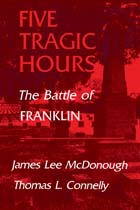
The genesis of the senseless tragedy, according to McDonough and Connelly, lay in the appointment of Hood to command the Army of Tennessee. It was his decision to throw a total force of some 20,000 men into an ill-advised frontal assault against the Union troops. The Confederates made their approach, without substantial artillery support, on a level of some two miles. Why did Hood select such a catastrophic strategy? The authors analyze his reasoning in full. Their vivid and moving narrative, with statements from eyewitnesses to the battle, make compelling reading for all Civil War buffs and historians.
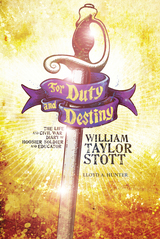
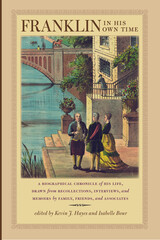
@font-face { font-family: "Courier New";}@font-face { font-family: "Times";}@font-face { font-family: "Cambria";}@font-face { font-family: "Palatino";}p.MsoNormal, li.MsoNormal, div.MsoNormal { margin: 0in 0in 0.0001pt; font-size: 12pt; font-family: "Times New Roman"; }div.Section1 { page: Section1; }
In his time Benjamin Franklin (1706–1790) was the most famous American in the world. Even those personally unacquainted with the man knew him as the author of Poor Richard’s Almanack, as a pioneer in the study of electricity and a major figure in the American Enlightenment, as the creator of such life-changing innovations as the lightning rod and America’s first circulating library, and as a leader of the American Revolution. His friends also knew him as a brilliant conversationalist, a great wit, an intellectual filled with curiosity, and most of all a master anecdotist whose vast store of knowledge complemented his conversational skills. In Franklin in His Own Time, by reprinting the original documents in which those anecdotes occur, Kevin Hayes and Isabelle Bour restore those oft-told stories to their cultural contexts to create a comprehensive narrative of his life and work.
The thirty-five recollections gathered in Franklin in His Own Time form an animated, collaborative biography designed to provide a multitude of perspectives on the “First American.” Opening with an account by botanist Peter Kalm showing that Franklin was doing all he could to encourage the development of science in North America, it includes on-the-spot impressions from Daniel Fisher’s diary, the earliest surviving interview with Franklin, recollections from James Madison and Abigail Adams, Manasseh Cutler’s detailed description of the library at Franklin Court, and extracts from Alexander Hamilton’s unvarnished Minutes of the Tuesday Club. Franklin’s political missions to Great Britain and France, where he took full advantage of rich social and intellectual opportunities, are a source of many reminiscences, some published here in new translations. Genuine memories from such old friends as Thomas Jefferson and John Adams, as opposed to memories influenced by the Autobiography, clarify Franklin’s reputation. Robert Carr may have been the last remaining person who knew Franklin personally, and thus his recollections are particularly signific

The most original and most delightful of the Founding Fathers, Benjamin Franklin was publisher and printer, essayist and author, businessman and “general,” scientist and philologist, politician and diplomat, moralist and sage—and a thoroughly rational patriot who was a major force in winning his country’s independence and securing its life in the Constitution. Born poor in Cotton Mather’s Boston, he was soon at ease in Quaker Philadelphia, and later in royal London, and in elegant Paris. Born with no advantages, he died wealthy and esteemed. He was the quintessential American, almost totally free of the limits of his environment, ready to accept any challenge, to speculate, experiment, and question.
Esmond Wright, the distinguished English scholar of America, sees Franklin as an Old England Man and a reluctant revolutionary; civilized, urbane, devious, and on occasion just a little unscrupulous. For, despite his charm and genius, Franklin was not admired by everybody. His contemporary John Adams thought little of his political abilities, and the Federalist pamphleteer William Cobbett called him a “crafty and lecherous old hypocrite.” In the next century, Mark Twain, Hawthorne, and Melville did not value him; still later, D. H. Lawrence despised the middle-class morality he promoted. Many today deplore his lack of interest in the arts or metaphysics, his lack of passionate commitment, his opportunism, his occasional coarseness. Yet his success in business, his many-faceted public career, his ingenious inventions and world-renowned scientific genius, his splendid prose style, his worldly wisdom, and the attractive personality that shines through his remarks and writings, made Benjamin Franklin the “new man” of the eighteenth-century dream and also vastly appealing to the modern temper. Wright’s new biography presents a fully rounded portrait of this remarkable man for all ages.
This first comprehensive biography of Franklin in fifty years has taken advantage of Yale’s massive edition-in-progress of Franklin’s papers and of the many specialized studies inspired by the correspondence. Franklin of Philadelphia, designed for the general reader, is also a work for scholars, for the author appends a thorough analysis of other interpretations of Franklin’s career and personality.
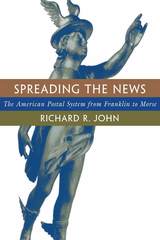
In the seven decades from its establishment in 1775 to the commercialization of the electric telegraph in 1844, the American postal system spurred a communications revolution no less far-reaching than the subsequent revolutions associated with the telegraph, telephone, and computer. This book tells the story of that revolution and the challenge it posed for American business, politics, and cultural life.
During the early republic, the postal system was widely hailed as one of the most important institutions of the day. No other institution had the capacity to transmit such a large volume of information on a regular basis over such an enormous geographical expanse. The stagecoaches and postriders who conveyed the mail were virtually synonymous with speed.
In the United States, the unimpeded transmission of information has long been hailed as a positive good. In few other countries has informational mobility been such a cherished ideal. Richard John shows how postal policy can help explain this state of affairs. He discusses its influence on the development of such information-intensive institutions as the national market, the voluntary association, and the mass party. He traces its consequences for ordinary Americans, including women, blacks, and the poor. In a broader sense, he shows how the postal system worked to create a national society out of a loose union of confederated states. This exploration of the role of the postal system in American public life provides a fresh perspective not only on an important but neglected chapter in American history, but also on the origins of some of the most distinctive features of American life today.
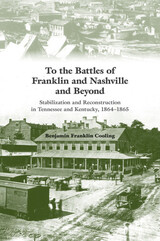
“Benjamin Franklin Cooling has produced a triumphant third volume to his definitive study of Tennessee and Kentucky in the Civil War. Like his first two volumes, this one perfectly integrates the home front and battlefield, demonstrating that civilians were continually embroiled in the war in intense ways comparable to and often surpassing the violence experienced by soldiers on the battlefield. The impacts of armies, guerrillas, and other military forces on civilians was continual, terrifying, and brutal in nearly all parts of the Confederacy’s Heartland.” —T. Michael Parrish, Linden G. Bowers Professor of American History, Baylor University
“Cooling’s scholarship is indeed sound and based on extensive research in a variety of original sources that range from manuscript collections to newspapers, with an exhaustive list of secondary sources. His work represents the first new interpretations of this important part of the war in decades.” —Archie P. McDonald, Regent’s Professor and Community Liaison, Stephen F. Austin State University
In two preceding volumes, Forts Henry and Donelson and Fort Donelson’s Legacy, Benjamin Franklin Cooling offered a sweeping portrayal of war and society in the upper southern heartland of Kentucky and Tennessee during the first two and a half years of the Civil War. This book continues that saga as Cooling probes the profound turmoil—on the battlefield, on the home front, within the shadow areas where lawlessness reigned—that defined the war in the region as it ground to its close.
By 1864 neither the Union’s survival nor the South’s independence was any more apparent than at the beginning of the war. The grand strategies of both sides were still evolving, and Tennessee and Kentucky were often at the cusp of that work. With his customary command of myriad sources, Cooling examines the heartland conflict in all its aspects: the Confederate cavalry raids and Union counteroffensives; the harsh and punitive Reconstruction policies that were met with banditry and brutal guerrilla actions; the disparate political, economic, and sociocultural upheavals; the ever-growing war weariness of the divided populations; and the climactic battles of Franklin and Nashville that ended the Confederacy’s hopes in the Western Theater. Especially notable in this volume is Cooling’s use of the latest concepts of “hybrid” or “compound war” that national security experts have applied to the twenty-first-century wars in Iraq and Afghanistan—a mode of analysis that explores how catastrophic terrorism and disruptive lawlessness mix with traditional combat and irregular operations to form a new kind of warfare. Not only are such concepts relevant to the historical study of the Civil War in the heartland, Cooling suggests, but by the same token, their illumination of historical events can only enrich the ways in which policymakers view present-day conflicts.
In chronicling Tennessee and Kentucky’s final rite of passage from war to peace, To the Battles of Franklin and Nashville and Beyond is in every way a major contribution to Civil War literature by a masterful historian.
READERS
Browse our collection.
PUBLISHERS
See BiblioVault's publisher services.
STUDENT SERVICES
Files for college accessibility offices.
UChicago Accessibility Resources
home | accessibility | search | about | contact us
BiblioVault ® 2001 - 2024
The University of Chicago Press









